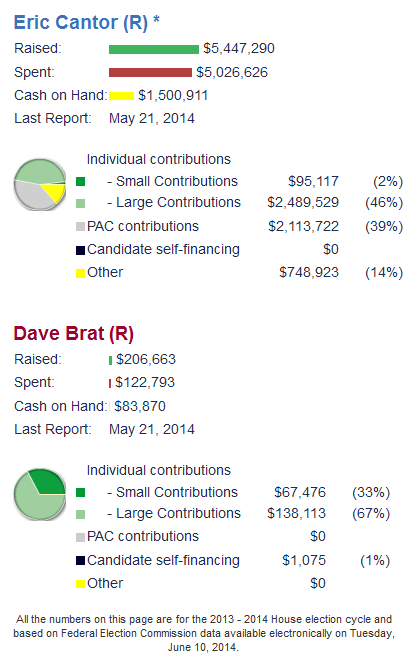“Dollars do not vote, you do,” Dave Brat said in his victory speech Tuesday night after his unlikely defeat of House Majority Leader Eric Cantor (R-Va.) in the Republican primary. Nowhere was it clearer that dollars do not vote than in Brat’s campaign, which was out-resourced by a whopping $4.75 million.
Videos by Rare
As Rare’s Jeremy Lott noted, Cantor’s campaign spent “’well over $1 million’ and will probably be closer to $3 million, to win this primary fight,” while the Vox graph below showed in color what Brat was up against.

It’s a stunning disparity to be sure, but it hasn’t been an uncommon for tea party candidates to force establishment politicians to spend big to protect their seats. Even when tea party challengers don’t win, they’re forcing the establishment to take them seriously.
Consider the following three primary match-ups: the Lindsey Graham-Lee Bright et al. U.S. Senate race in South Carolina, the Thom Tillis-Greg Brannon U.S. Senate race in North Carolina and Thad Cochran-Chris McDaniel U.S. Senate race in Mississippi.
What do these races have in common? First, the establishment candidates significantly outspent tea party candidates.
Second, tea party pressure had a lot to do with that.
Lindsey Graham, for example, spent $8.5 million on the 2014 race, outflanking all his Republican contenders, who barely spent $2 million combined, according to Open Secrets.
Graham ended up steamrolling his competition with 57 percent of the vote Tuesday with Lee Bright coming in a distant second (15 percent).
However, it’s telling that “No Democratic opponent in a Senate race has ever cost him so much,” Lalita Clozel wrote at Open Secrets.
Establishment favorite Thom Tillis outspent constitutional conservative Greg Brannon by a wide-margin as well, with the help of a late $1.6 million surge in funding from the U.S. Chamber of Commerce and the Karl Rove-backed group American Crossroads and endorsements of the National Rifle Association and National Right to Life.
Tillis would roll on to victory with 46 percent of to vote to Brannon’s 27 percent, but not before Brannon got Rand Paul’s endorsement at a rally just before the primary.
That probably won’t be the last thing we hear from Brannon who Glenn Beck called “perhaps the best candidate [he has] ever talked to the first time out of the chute.”
Sen. Thad Cochran (R-Ms.), a six term incumbent, failed to secure enough of the vote last week to avoid a run-off with tea party state senator Chris McDaniel. Both sides have pumped upwards of $12.4 million total into the campaign, with the help of various Super PACs.
Cochran’s campaign outspent the McDaniel campaign by $2 million. Only Super PACs flocking to McDaniel’s support were able to close that gap.
According to the Star Tribune, “Club for Growth was the biggest spender, pumping in at least $2.24 million — $1.17 per registered voter — on McDaniel’s behalf. He also got more than $1 million from the Senate Conservatives Fund and its political action committee, $650,000 from Tea Party Patriots and a combined $570,000 from FreedomWorks and Citizens United.”
Despite the Cochran campaign’s funds, many political analysts have McDaniel winning in the run-off.
As for Cantor, tea party Kentucky Republican Rep. Thomas Massie attributed his loss to his principles clashing with those of his tea party base, not his lack of spending.
“When you outspend your opponent 20-to-1, you can’t blame it on turnout, you can’t blame it on anything but the candidate and his voting record,” Massie said.
Massie went on to say Cantor was “out of touch with his constituents.”
Cantor’s negatives for many tea party sympathizers, in terms of principle, were his support of NSA snooping, the Patriot Act, amnesty and his inability to facilitate meaningful repeal-and-replace legislation for Obamacare while in the House.
But, as a Politico poll pointed out, Cantor’s leanings on amnesty — as has been suggested — weren’t the be all end all for voters. It was, in fact, the total package that Cantor’s constituency was taking a stand against.
The poll found that “70 percent of GOP registered voters would support such [an immigration reform], while 27 percent would oppose,” while about “63 percent of those surveyed in his district said they did not approve of the job Cantor has been doing.”
Brat, for his part, is ready to get to work, railing against crony capitalism and appealing to the Founding Fathers.
“Our founding was built by people who were political philosophers, and we need to get back to that, away from this kind of cheap political rhetoric of right and left,” he said post-victory.
It appears the people want to get back to that too.



